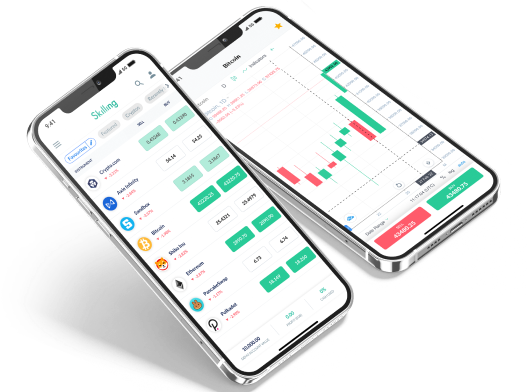Banking crises have been pivotal events in financial history, often leading to significant economic repercussions. This article explores the causes of banking crises, examines historical instances, answers common questions, and discusses how platforms like Skilling can help traders understand and navigate these events.
Experience Skilling's award-winning platform
Try out any of Skilling’s trading platforms on the device of your choice across web, android or iOS.

Why do banking crises happen?
Banking crises usually happen because of several reasons. Often, there is not enough regulation to keep banks in check, and banks might take too many risks. Economic problems or sudden big changes in the economy can also cause these crises. Sometimes, people start losing trust in banks and withdraw their money, which adds to the problem.
These crises come from both what banks do internally and what's happening in the wider economy. Banks might make bad choices in lending money or investing, there could be mistakes in economic policies, or too much guessing in the markets. Even unexpected big events in the economy can trigger a crisis. It's important to understand these reasons to see how banks that seem stable can face problems and cause major issues in the financial system. Key contributors include:
- High-risk lending practices: Banks sometimes engage in risky lending, such as offering loans to borrowers with questionable creditworthiness, leading to high default rates.
- Asset bubbles: Excessive lending can inflate asset prices, creating bubbles. When these bubbles burst, they can lead to widespread loan defaults.
- Economic downturns: Recessions can lead to increased unemployment and business failures, escalating loan defaults.
- Regulatory oversights: Inadequate regulation can allow risky banking practices to go unchecked.
- Global financial interconnection: In today's globalized economy, problems in one country's banking system can quickly spread to others.
Historical banking crisis events
Banking crises are complex events that can have far-reaching effects on the global economy. Understanding the causes, historical context, and responses to these crises is essential for anyone involved in the financial markets. The history of banking crises includes several notable events that had profound global impacts:
- The Great Depression (1930s): Triggered by a stock market crash and bank runs, it led to widespread bank failures and severe economic downturn.
- Savings and Loan Crisis (1980s): Caused by risky lending practices and deregulation in the U.S., leading to the failure of numerous savings and loan associations.
- Asian Financial Crisis (1997): Initiated by the collapse of the Thai baht, it led to widespread financial distress in East Asia.
- Global Financial Crisis of 2007-2008: Sparked by the subprime mortgage crisis in the U.S., it resulted in significant bank failures and global economic recession.
FAQs
1. What are early signs of a banking crisis?
Rapid increases in loan defaults, sudden drops in real estate or stock prices, and a decline in consumer and business confidence.
2.How can banking crises be prevented?
Strong regulatory frameworks, prudent lending practices, and effective risk management by banks are key.
3.What is the impact of a banking crisis on the economy?
Banking crises can lead to credit crunches, reduced investment, higher unemployment, and overall economic slowdown.
4. How do central banks respond to banking crises?
Central banks may lower interest rates, inject liquidity into the banking system, and implement policies to stabilize the financial system.
Navigating banking crises with Skilling
During banking crises, staying informed and understanding the market's response is vital. Skilling supports this need by offering real-time economic news and market analysis, and educational webinars. These webinars provide analysis of current economic events, including banking crises, providing traders with comments and explanatory information. They can be an invaluable resource for traders looking to understand the full scope of a crisis and adjust their trading strategies in an informed manner. Join Skilling today.
What's your Trading Style?
No matter the playing field, knowing your style is the first step to success.












